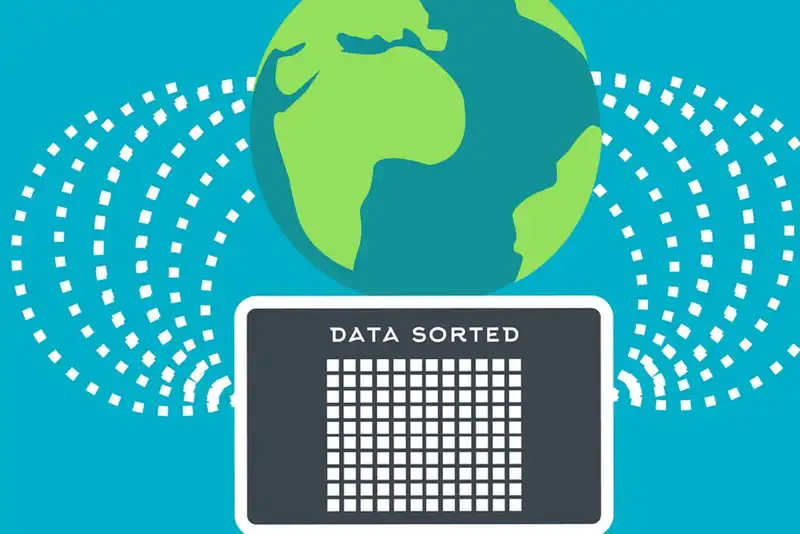How To Choose The Right Data Management Tools For Your Business
What is data management?
Data is the new oil, in other words, data is a commodity. At the moment, businesses and organizations are facing a constant struggle to keep up with the data explosion. Data is more valuable than ever before, as organizations can now leverage data to make better business decisions and improve their operations.
But, how do you keep track of all of your company's data? Data management is the process of keeping track of your company's data and records and ensuring that it's all easily accessible and searchable.
Organized data will help drive business operations and enhance company reporting processes. In other words, without a well-managed data management program, your company will struggle to track data and perform day-to-day operations. A comprehensive data management program will help you identify gaps and reevaluate current processes to ensure you have the best possible data management program in place.
Why is data management important?

Data management is a key concern for any organization that is serious about being able to extract value from its data. It is especially important for businesses that deal with or process data on a regular basis. Companies that store and process cloud data must keep track of all the data they have and make sure that it is accurate and reliable. Here are 5 advantages of data management-
1. Data Is a Priceless Asset that helps fast decision making-
Data management is critical because the data generated by your organization is a priceless resource. The last thing you want to do is invest time and resources in gathering data and business intelligence only to have it lost or misplaced. In that case, you'd have to invest additional time and resources to obtain the same business intelligence that you already possessed. Accumulated data especially is a boon for big global companies as it helps them make better business strategies and react faster to changing trends.
2. Data management is vital for a company's security-
Effective data management has become increasingly important within organizations in recent years, as organizations have become susceptible to a rising prevalence of compliance regulations, and have seen a significant increase in information storage capacity. This leads to the collection of an enormous amount of data and documents. According to the International data corporation (IDC), this growth rate is not expected to slow as data storage will become more than double by 2030. Big data is frequently used to refer to these massive amounts of data gathered from ERP systems, HRMS, CRM systems, and overall business documents that hold sensitive company details that if leaked can ruin a company's future.
3. Data loss could be a catastrophic event for your business-
In today's business world, companies that are unable to manage their master data for a long period and lose crucial data are witnessing massive losses and have also declared bankruptcy. A robust data management strategy is critical to your business's success and is one of the best practices that can grow your business exponentially.
4. Effective decision-making-
Proper data collection in cloud-based setup enables all employees to view and analyze the most up-to-date information. This enables your business to make the most accurate decisions possible based on the most accurate data available.
5. Data management leads to better productivity within the budget-
When data is managed in a comprehensive way, it helps in spotting and resolving issues way faster. Employees seamlessly can access available information and do not have to duplicate information again and again.
Data management is a complex task that requires significant time and resources.
Zipschedules suggests the right data management tool will save you time, money, and headaches. We’ve narrowed down the choices to help you find the best data management tool for your company.
How to choose the right data management tool?
Advanced data management must consider providing continuously available, high-fidelity data at the needed locations and across all businesses. Managing data pipelines requires monitoring and enhancing both cost and performance. The qualities that a result-oriented data management tool imbibes are-
1. High performance- Modern businesses must now manage vast amounts of data. Moreover, data must be moved or processed locally in real-time. Especially with AI and machine learning applications, data management must not become a roadblock. High-performance data management increases data output and productivity.
2. Stability In reality- Both hardware and software can fail, so processes must be crafted to be fault-tolerant. A data management system should be error-proof meaning guarantees 99.9% uptime will have 0.1 percent downtime, which can cause significant issues. Irreparable user data or unsaved work should be non-negotiable.
3. Data safety is important- This cannot be ignored. Cloud based data security solutions provide the highest level of data protection and application availability.
4. Backup- Multiple products raise costs, complexity, and risk. In an ideal world, your data will be stored and protected everywhere in real time. Seek solutions that can automate backup copies and recover data quickly after a natural disaster or attack.
5. Activedata governance- The best data management systems learn from user activity and apply policies to customers' functionalities. Data management software is required to connect to multiple data sources and enhance basic technical metadata with deep insights and suggestions.
Different Types of Data Management Tools

For businesses that want to move to a more digital world, these are the best tools for managing data-
1. Product Information Management (PIM)-
This is the best tool for manufacturers and distributors who want to be able to control all of their product features from one place.
People who work for companies will use a product information management (PIM) solution to make sure that catalog design programs, sales channels, or agents, such as sellers and retail stores have the right information about the products that they sell.
2. Master Data Management (MDM)-
These types of tools are highly adopted by large enterprises as they manage master data and centralize it at all levels in the business such as employees, accounts, customers, regulations, and for other operational purposes in real time.
Keymapping, data cleansing, centralization, payment control, multi-domain support, information exchange, and global connectivity in different places are components of them. SAP NetWeaver, Microsoft Azure, Oracle, Profisee, and IBM InfoSphere are some of the companies that make these kinds of things.
3. Data modeling-
This is the method of changing your data so that it can be stored in the company's database. It's possible to make conceptual models and set rules for how your data must be consistent or clean with these kinds of data management tools.
4. Data Warehousing (DW)-
Data warehouse programs generate storage locations for your data and are linked to your existing hardware already installed with the company. They are tools for storing information, but by themselves, they don't give it a structure or help you think about it.
They may also use their own tools for things like data quality analysis, metadata, data model, security, and backup.
Another thing about data management software is that it can organize your data in different ways, like in conceptual data, in a tree format, or as a channel.
Key factors when choosing a data management tool

Some of the best practices and factors to consider before choosing a data management tool are-
1) Data integration-
The system under consideration must integrate with other software applications such as your CRM, ERP, and email marketing system. This may be direct integration with the specific software or it may be possible to integrate using open source code.
2) Scalability-
Ascertain that the system has the capacity to expand in tandem with your data and business in the future. Keep in mind that you are likely to be incorporating the data all the time, so even if your requirement is small at the moment, it can quickly grow if you are collecting and upgrading your data on a regular basis.
3) Affordability and adaptability-
While cost is undoubtedly a factor to consider in any business expenses plan when buying enterprise data management tool, it is prudent to base your decision on the software's worthiness for your type of organization.
It could be costly to take on a system and then invest time in developing it only to discover that it is insufficient for your needs. Similarly, there is no reason to purchase the most costly software available if you are unlikely to use the majority of its features.
4) Internet hosting-
Will you host the data and software system in-house or will you outsource it to a company? This may have an effect on support, cost of hardware, security, and possibly performance.
5) Utility-
Consider the system's usability for all staff members who will be obligated to use it. In some companies, this may include marketing people, the IT department, and database developers. Consider the viability from everyone's point of view, and determine whether you can assign varying levels of permission to different teams.
Numerous systems support drag-and-drop execution, which facilitates working in an intuitive manner, so the system works properly and is used by the entire team.
6) Security-
Data security is a critical component of any database platform. Business-critical data and private details must be securely stored to comply with regulations and to prevent any kind of theft.
It is critical to consider both physical risks to data (e.g., fire, theft,) and cyber risks, such as hacking or corruption of data caused by negligence. Any system you implement must consider the issue of data security.
Managing data can be a real pain. Data is everywhere, and it’s not always easy to find what you need.
How To Choose The Right Data Management Tool For Your Business as suggested by Zipschedules is here to help you find the right tools and resources so you can focus on what matters most.
5 Best Data Management Tools
Data Management is one of the most challenging aspects of data science. After you collect and store your data, you need to make sure it stays secure and organized. Fortunately, there are a variety of tools available to help. In this article, we overview five of the best data management tools for data scientists. From clean storage to exploratory analysis, these tools can help you manage data for any project.
- Amazon Web Services
- Microsoft Azure
- Google cloud platform
- Profisee
- Tableau
1. Amazon Web Services
Amazon Web Services is widely known for its excellence in cloud data computing, and for a valid reason. Amazon Web Services (AWS) is a well-known cloud based platform that enables on-demand services such as security, computing, networking, storage, security, and databases to be accessed via the internet from anywhere in the world without the user having to supervise these resources.
Amazon Web Services is the market leader in the Cloud Market and offers cloud services in more than 200 countries. It offers 200+ cloud computing services across a variety of industries like storage, computation, database, messaging, migration, networking, analytics, big data, and so on and so forth.
Amazon Web Services is an agile, secure, and dependable cloud service provider and the market's most sought-after hard skill. Businesses have invested billions of dollars in this service provider, and the figure is expected to continue increasing in the near future.
Mc Donalds, WeWork, and Repp health are just a few of the big names that Amazon web services give its assistance and services.
Data Management
2. Microsoft Azure

Azure is a public cloud data platform that offers solutions for analytics, virtual computing, storage, networking, and more. It can supplement or replace on-premise servers.
Its key features include-
1. Improve backup and recovery-
Azure is a disaster recovery and backup dream technology that is flexible and has built-in integration capabilities and advanced site recovery.
Azure, being a cloud based solution, can back up data in almost any language, on any OS, anywhere anytime. You also control the frequency and scope of your backups daily, weekly, monthly, and so on.
Azure site recovery can improve your tape backup by providing outsourced replication, minimal onsite upkeep, 99 years of data retention, and low or no capital investment. There are three copies of your data in the data center and three more in a remote Azure data center, so you never have to be concerned about data loss.
2. Host and Develop Mobile Apps-
With patch management, AutoScale, and inclusion for on-premise apps, Azure makes web and mobile apps independent and adaptable improving data quality.
It lets you focus on improving your apps rather than managing your virtual networks. Azure also supports live migration, allowing you to automate code updates over time. It allows you to have the resources you need when traffic is high while saving you money.
3. Allocate and supplement Active Directory-
This gives your Domain name global reach, centralized management, and improved security by integrating Azure with your Active Directory.
You can use Azure to globally distribute an Active Directory environment with direct connect.
Active Directory inclusion with Microsoft Azure will be the crucial tool to manage and maintain access to all tools for multi domain locations or use on-premise or cloud apps like Microsoft 365.
4. Embrace IoT Industry Solutions-
SMEs can use Microsoft Azure's agility, adaptability, and security to help implement Technology devices. Begin gathering new data about your corporation by connecting your devices to the cloud. and improve business decisions, lower costs, customer experiences, and accelerate development. Remote monitoring, predictive maintenance, and analytics are other advantages.
3. Google Cloud Platform
Big data and machine learning-related services are being added to Google's cloud platform on a regular basis. For SQL-like queries against multi-terabyte data sets, the Google BigQuery service is a good example of Google's big data services for processing and analytics. The Google Cloud Dataflow service, on the other hand, is a data processing service for analytics; extract, transform, and load; and real-time computational projects, among others. For big data processing, the system enables Apache Spark and Hadoop services from Google Cloud Dataproc.
Cloud computing services provided by Google are known as Google Cloud. Hosted computing, storage, and apps services run on Google hardware as part of the platform. Connectivity to Google Cloud Services is possible through public or private internet connections or a dedicated network connection for software developers and other enterprises IT professionals.
4. Profisee
Profisee's multidomain, cloud-based Master data Management (MDM) platform enables customers to create and manage trusted business information. Data integration, protection and conservation, governance, customer engagement, golden recordkeeping, data integrity, and workflows are all main aspects of the product. Profisee is designed specifically for the Microsoft Azure environment, with bi-directional integrations to Azure Purview, Data Factory, and others.
5. Tableau
Tableau is a fantastic data visualization and business intelligence tool for reporting on and analyzing massive amounts of data. Salesforce acquired Tableau in 2019 which originally was a US-based company founded in 2003. It enables users to create a variety of maps, charts, graphs, and stories with the help of easy to use dashboards for the purpose of visualizing and analyzing data in order to aid in business decision-making.
Tableau Highlights -
1. Tableau enables powerful data finding and exploration, allowing users to quickly answer critical questions.
2. No previous programming experience is required; users without experience in the field can immediately begin creating Tableau visualizations.
3. Tableau allows the user to create reports through the joining and integrating of multiple datasets.
4. Tableau Server provides a centralized location for managing a company's reported data sets.
Data is the backbone of your company. It’s what drives your strategy, informs your decisions, and helps you to improve.
You need a data management tool suggested by Zipschedules that will help you to organize your company’s data and automate your processes.


